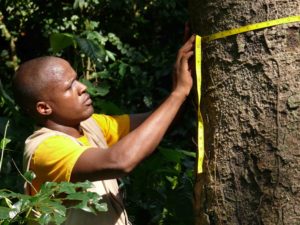Tropical forests are becoming less effective as carbon sinks
 6 Maret 2020
6 Maret 2020
The world’s rainforests act as a giant carbon sink, sucking up and storing vast quantities of atmospheric CO2. Yet that may not stay the same for long, scientists have warned.
Tropical forests are losing their ability to absorb CO2 from manmade greenhouse gas emissions faster than expected, says a team of scientists led by experts at the University of Leeds. Some forests like those in the Amazon are becoming so saturated that they may turn carbon neutral within just a decade and a half, the researchers write in a study published in the journal Nature.
Trees suck up CO2 from the air through the process of photosynthesis. Plants grow faster in carbon-rich environments, yet the rate of tree loss (through deforestation, fire or droughts) can supersede a forest’s ability to absorb CO2. This will especially impact forests in the Amazon where the rapid loss of forest cover driven by land clearing and climate change means that local forests are becoming less effective at carbon sequestration.

The scientists, who comprise more than 100 researchers from across the planet, reached this conclusion after monitoring tree growth and mortality rates from undisturbed forests spanning 11 countries in Africa from over 50 years. They then compared these results with measurements taken from 321 sites across rainforests in the Amazon.
They estimate that the carbon sink capacity of several African forests will decline 14% by 2030 while the carbon sink capacity of the Amazon’s forests will drop to zero by 2035. This projection spells further trouble for our ongoing efforts to reduce levels of atmospheric CO2 in coming decades.
“The striking implication from all this is that it appears the tropical carbon sink may be disappearing, first in Amazonia, then in Africa, which means that we really must reassess global targets for reducing greenhouse gas emissions,” forest ecologist Andy Marshall said in a statement.
“This decrease is decades ahead of what even the most pessimistic climate models predicted,” warns Wannes Hubau, a forest ecosystems expert at Belgium’s Royal Museum for Central Africa. “Mortality is a natural part of the cycle of forest trees. However, by pumping so much CO2 in the air, we have accelerated this cycle and blew its magnitude up to unknown proportions.”
Intact tropical forests sequestered around half of the planet’s terrestrial carbon uptake in the 1990s and early 2000s, locking up some 15% of anthropogenic CO2 emissions. The carbon sink capacity of aboveground biomass in intact African tropical forests stayed stable for three decades to 2015, at 0.66 tons of carbon per hectare a year. The Amazon’s forests, however, have been experiencing marked declines as a result of increasing tree mortality from manmade and environmental factors.
“Overall, the uptake of carbon into Earth’s intact tropical forests peaked in the 1990s,” the scientists write. “Given that the global terrestrial carbon sink is increasing in size, independent observations indicating greater recent carbon uptake into the Northern Hemisphere landmass reinforce our conclusion that the intact tropical forest carbon sink has already peaked.”
The post Tropical forests are becoming less effective as carbon sinks appeared first on Sustainability Times.
